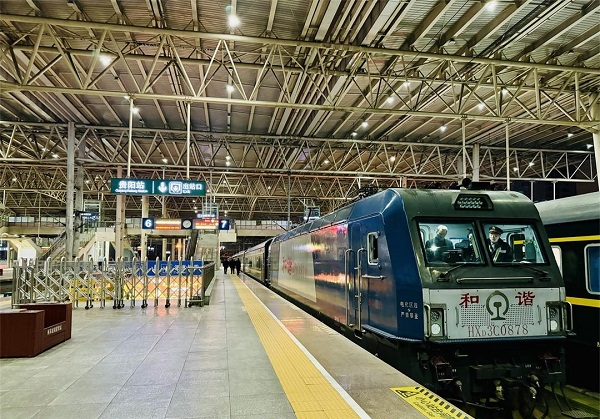New railway section connects Guizhou and Sichuan, boosting regional connectivity


The Xuyong-Bijie section of the Longchang-Huangtong Railway, an essential component of the Western Land-Sea New Corridor, starts operation, Dec 21, 2023. [Photo/ddcpc website]
At 6:30 am on Thursday, a passenger train departed from the Guiyang Station in Guizhou province and headed for the Xuyong North Station in neighboring Sichuan province.
The train operation marked the opening of the Xuyong-Bijie section of the Longchang-Huangtong Railway, an essential component of the Western Land-Sea New Corridor.
Longchang is in Sichuan and Bijie and Huangtong are in Guizhou.
Located in the hinterland of western China, the corridor connects to the Silk Road Economic Belt, the 21st Century Maritime Silk Road, and the Yangtze River Economic Belt.
With a length of 189 kilometers and a designated speed of 120 kilometers per hour, the Xuyong-Bijie section of the Longchang-Huangtong Railway is a convenient railway passage from the Chengdu-Chongqing Economic Circle to Guizhou as well as Nanning and the Beibu Gulf in the Guangxi Zhuang autonomous region.
The section starts from the Xuyong North Station in Xuyong, a county under the administration of Luzhou in Sichuan in the north, passes through Zhenxiong and Weixin counties in Zhaotong, Yunnan province in the south, and reaches the Bijie East Station in the city of Bijie, Guizhou province.
The section has eight bridges and 67 tunnels, and the bridge-tunnel ratio is 86 percent.
The Fengjiazhai Bridge in Zhenxiong, the highest bridge in the section, has a pier of about 129 meters, which is equivalent to the height of a nearly 50-story building.
The 12.8-kilometer Spotted Bamboo Forest Tunnel at the juncture of Sichuan and Yunnan passes through nine faults.
Throughout construction, which began in October 2016, the design and construction units overcame geological risks such as high gas, water inrush, mud inrush, rockburst, shallow burial, and the fault fracture zone, said Zhu Linlin, an official with China Railway Chengdu Group Co Ltd.
The newly-opened Xuyong-Bijie section passes former revolutionary bases and areas inhabited by ethnic Miao and Yi groups and is of great significance for promoting the coordinated development of regional economy and society, consolidating the achievements of poverty alleviation, serving the revitalization and development of rural areas, and promoting ethnic cultural exchanges, Zhu said.







